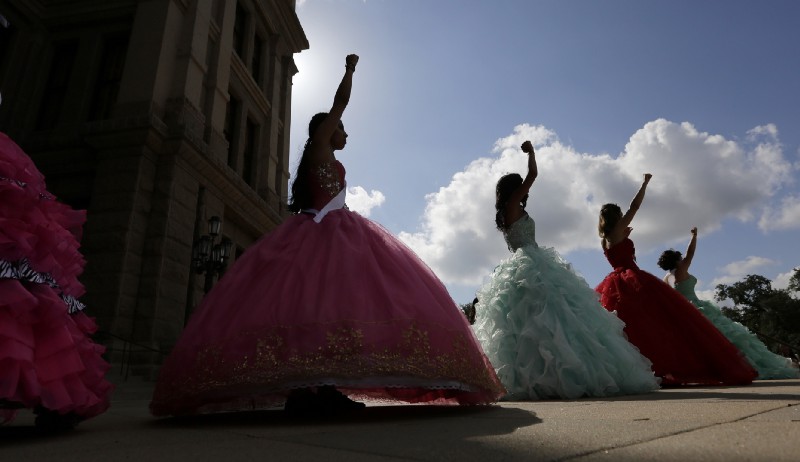A striding anti-immigration bill in Texas suffered another blow Wednesday when a federal judge dismissed a lawsuit from Texas Attorney General Ken Paxton arguing the law was constitutional.
Referred to as SB4, the law targets so-called sanctuary cities―or, those that do not require local police to enforce federal immigration law. Set to take effect September 1, SB4 will authorize law enforcement to inquire about immigration status under any circumstances, in addition to requiring local officials to comply with federal detainer requests. Refusal to do so could result in a Class A misdemeanor (resulting in up to a $4,000 fine and potentially prison time), with possible additional fines up to $25,500 per day as well as removal from public office.
Activists and advocacy groups have accused SB4 of being a “show me your papers” bill along the lines of Arizona’s SB 1070, which passed in 2010 only to be met with immediate resistance and legal action. Its outsized impact on immigrant communities and communities of color has also been called out by opponents, many of whom have noted the disproportionate extent to which the law targets Latinx Texans.
The state government seems to have expected that opposition. Shortly after Gov. Greg Abbott (R) signed SB4 into law, Paxton sued in an effort to stave off expected counter-suits. The lawsuit, which singles out several cities, including the state capital, Austin, asked for SB4 to be declared constitutional. But U.S. District Judge Sam Sparks dealt Paxton a blow on Wednesday, ruling that to allow governments a judicial decision before a law has gone into effect “would be to ‘open a Pandora’s box and invite every local government to seek a court’s judicial blessing’ on a law prior to it taking effect.”
While Sparks didn’t go so far as to say the law was unconstitutional, the ruling is still a blow for SB4―and an encouraging sign for its opponents.
“Recognizing that the state was seeking an improper advisory opinion when it filed the preemptive lawsuit challenging some of the major opponents of the proposed SB4…yesterday’s decision leaves the constitutionality of the enacted SB4 to be determined by the proper federal court in San Antonio, where motions for preliminary injunction are now pending,” said Thomas A. Saenz, president and general counsel of the Mexican American Legal Defense and Education Fund, or MALDEF.
His words were echoed by others, who pointed to the state government’s recent string of legal failures over a number of issues, raging from abortion rights to redistricting and immigration.
“The decision makes it really clear that the state’s actions are completely baseless,” Jose Garza, Executive Director of the Workers Defense Project, told ThinkProgress. “It’s only the latest example of Texas being rebuked for its actions.”
Garza went on to argue that SB4’s discriminatory nature sets the law up for legal action. “This is a coordinated and concerted attack against people of color and immigrant communities,” he said.
But while the decision came as good news, SB4’s opponents were quick to note that the real legal battle will play out in coming weeks. Much of the war over SB4 has been waged between Texas and local governments, many of whom―including Austin, Dallas, Houston, and San Antonio―are waiting on a separate case filed in San Antonio, which claims the law violates several provisions of the U.S. Constitution.
That case, Austin City Council Member Gregorio Casar said, is the one SB4 opponents are actively watching.
“The fight’s not over,” Casar told ThinkProgress. “Ultimately, today brought us the right ruling but the real work is going to be rallying after the judge in San Antonio decides. It clearly is good news, but it is not where the real fight was.”
Immigration activists aren’t just waiting around for the ruling. While SB4 was signed by Abbott last May, efforts to protest the law have ramped up this summer. The Texas legislature is currently embroiled in a heated and controversial special session, called after a number of must-pass bills failed to make it to Abbott’s desk during the regular session. The special session has given hardline lawmakers an opportunity to reintroduce a number of controversial bills, including legislation targeting abortion and the transgender community.
But it’s also served to unite protesters―including those hoping to stop SB4 in its tracks. As ThinkProgress reported last month, a grassroots coalition has sprung up across Texas, uniting advocates across issues and causes. That energy, Casar said, is crucial to the larger fight playing out, one formed in response not only to legislation in Texas but to broader national crackdowns instituted by President Donald Trump.
“The courts aren’t the only venue where this fight is important,” Casar noted. “In this moment, where we’re dealing with both the national government’s agenda and that of the state government…that’s a terrible thing for Texas, but even more terrible if we don’t build a movement that will last against that agenda. In this terrible moment, we are building a statewide backlash across issues.”
Assembling a statewide movement is proving crucial to countering much of the legislation currently underway. But in SB4’s case, opponents are planning for all scenarios. That means preparing for upcoming legal battles―but it also means turning to city governments and other systems.
“As we get closer to September 1, organizing around local policy that could provide some layer of protection between law enforcement and communities of color will likely increase,” said Garza. “What SB4 does it make it much more likely that there will be an enormous amount of racial profiling in our state.”
“This is going to continue to be a multi-faceted fight. It will move forward until it is stopped in its tracks,” he added. “The court in San Antonio will be making a decision any day now, but I suspect the litigation in any event will play on.”

